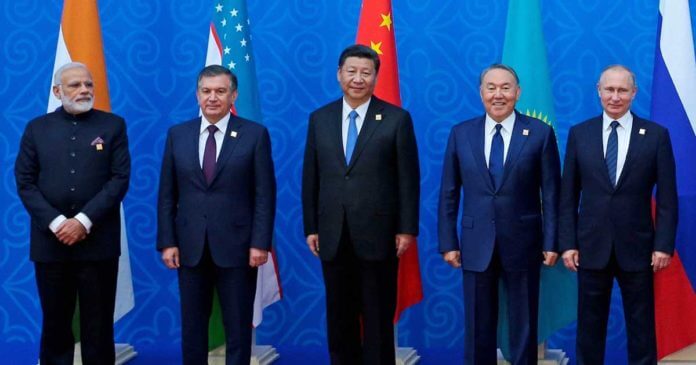www.aljazeerah.info
Opinion Editorials, June 2018
Archives
Mission & Name
Conflict Terminology
Editorials
Gaza Holocaust
Gulf War
Isdood
Islam
News
News Photos
Opinion Editorials
US Foreign Policy (Dr. El-Najjar's Articles)
www.aljazeerah.info
At Shanghai Cooperation Organization Summit: India Rejects China's One-Belt One-Road Project By Abdus Sattar Ghazali Al-Jazeerah, CCUN, June 18, 2018 |
 |
|
| Shanghai Cooperation Organization Summit, 2018 |
In the joint Qingdao Declaration of the Council of Heads of State of Shanghai Cooperation Organisation, India was the only member in the eight-nation bloc to refuse to endorse China's One Belt, One Road (OBOR) project, according to Indian Express.
India claims that OBOR or the Silk Road project a threat to its sovereignty over concerns on the China Pakistan Economic Corridor (CPEC), which goes through Pakistan-ruled Kashmir.
The 3,000-kilometre CPEC is aimed at connecting China and Pakistan with rail, road, pipelines and optical fibre cable networks.
India and Pakistan were accepted as full members of the SCO last year. Qindao SCO summit was the first gathering which both countries attended. India was represented by Prime Minister Narendra Modi and Pakistan was represented by President Mamnoon Hussain.
One Belt, One Road (OBOR) is Chinese President Xi Jinping’s landmark scheme to build infrastructure to connect China to the rest of Asia and beyond, a giant reworking of its old Silk Road.
The Qingdao summit declaration said the Member States note the new quality and dynamics that have emerged in various fields of cooperation since the Republic of India and the Islamic Republic of Pakistan’s accession to the SCO. They intend, based on strict observance of international treaties and SCO documents, to jointly promote the further expansion of the Organization's potential in all areas of its activities.
On the forthcoming meeting between US President Donald Trump and North Korean leader Kim Jong-un, the declaration said "the Member States advocate the settlement of the situation on the Korean Peninsula solely through a political and diplomatic approach based on dialogue and consultations. They support the peace initiatives of the international community, including those of Russia and China, aimed at the normalization of the situation, including the denuclearization of the Korean Peninsula, and securing long-term peace in Northeast Asia."
In this context, the Member States note the resumption of the intra-Korean dialogue, as well as the contact between the Democratic People's Republic of Korea and the United States, and urge all involved parties to support the negotiating process, the Qingdao summit declaration added.
On the current war in Syria, the SCO summit called for the implementation of an inclusive political process, under the direction of the Syrian people and by the Syrian people themselves, which must be conducted in accordance with the provisions of UNSC Resolution 2254 and proceed from the need for Syrian sovereignty, independence and territorial integrity, is the only alternative to settling the Syrian crisis.
"The Member States support the peace talks in Geneva under the auspices of the UN, note the efficiency of the Astana process, and call for all the parties to the conflict to take practical steps to implement the Memorandum on establishing the de-escalation areas to create favourable conditions for a political settlement of the situation in Syria. In this connection, the Member States welcomed the results of the Syrian National Dialogue Congress that took place on 30 January 2018 in Sochi as an important contribution to the promotion of the political process in Syria," the SCO said.
On the Trump abandoned Iranian nuclear deal, the SCO summit said it is important to consistently implement the Joint Comprehensive Plan of Action on the Iranian nuclear program, and call for participants to strictly observe their obligations with a view to ensuring its full and efficient implementation and promoting peace and stability in the region and globally.
On Ukrain, the SCO Member States affirmed the need for a political settlement of the Ukraine crisis based on the prompt and full implementation of the Minsk Agreements of 12 February 2015. At a summit in Minsk on February 11, 2015, the leaders of Ukraine, Russia, France, and Germany agreed to a package of measures to alleviate the ongoing war in the Donbass region of Ukraine. The new package of measures is intended to revive the Protocol, which had been agreed to on September 5, 2014.
On Afghanistan, the SCO summit argued that a military solution was not possible in the war-torn country. "The member states emphasize that there is no alternative to settling the situation in Afghanistan beyond political dialogue and an inclusive peace process by the Afghan people themselves and under their guidance, and call for boosting cooperation under a central coordinating role of the UN for ensuring stability and development of the country, the SCO declaration said adding:
"The Member States noted the results of the SCO-Afghanistan Contact Group meetings that took place on 11 October 2017 in Moscow and on 28 May 2018 in Beijing, and spoke in favor of activating the mechanisms for dialogue and cooperation on an Afghanistan settlement, including consultations in the Moscow format."
Abdus Sattar Ghazali is the Chief Editor of the Journal of America.
***
Share the link of this article with your facebook friends
|
|
|
|
||
|
||||||


